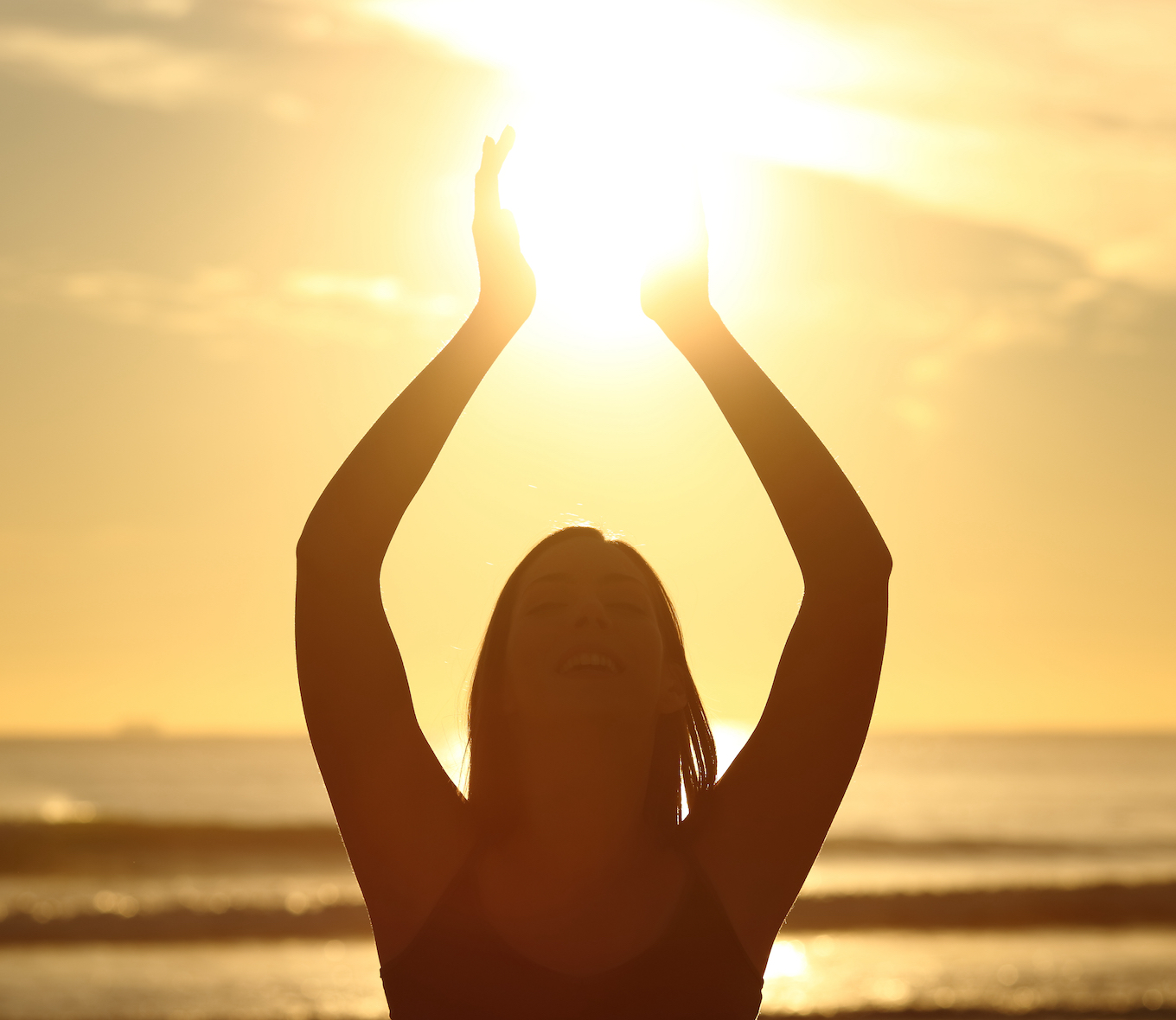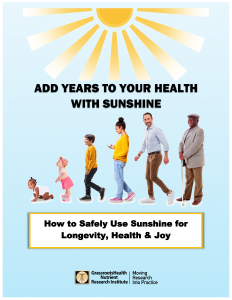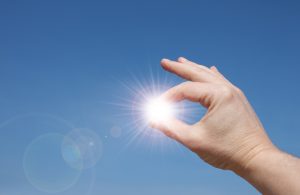Optimizing Your Health with Exposure to Sunshine: A Sunshine Month Review

From GrassrootsHealth
As public guidelines begin to change, knowledge of the harms of avoiding sunshine exposure must be balanced with the harms due to sunburns and overexposure
Key Points
- While vitamin D supplements can partially make up for inadequate sun exposure, no supplement can replace all the health benefits provided by sunshine exposure
- Due to the majority of current public health recommendations, most individuals are not getting the amounts of sunshine exposure their bodies need, and are therefore putting their health at risk by practicing sunshine avoidance
- According to world renowned dermatologist, Dr. Richard Weller, “…sunlight is the major alterable risk factor for skin cancer, but deaths from heart disease are a hundred times higher than deaths from skin cancer… we need to be more aware of, and we need to find the risk-benefit ratio. How much sunlight is safe, and how can we finesse this best for our general health?
- The information reviewed this Sunshine month, and summarized in this post, can help educate individuals on the risks and benefits of sunshine exposure, and how to balance them for their health
Sunshine has many health benefits beyond vitamin D production, and while vitamin D supplements can partially make up for inadequate sun exposure, no supplement can replace all the health benefits provided by sunshine exposure. Research has now made it clear that we must learn how to harness the power of the sun to support health and increase our lifespan. However, due to the majority of current public health recommendations, most individuals are not getting the amounts of sunshine exposure their bodies need, and are therefore putting their health at risk by practicing sunshine avoidance.
Implementing regular, safe, non-burning sun exposure can help individuals of all skin types maximize the health benefits produced from exposure to the sun while minimizing the risks associated with sunshine exposure, including that of melanoma. Use the information reviewed below to learn more about how you can balance the benefits and risks of sunshine for you, and why it’s essential to your health.
Public Health Recommendations are Beginning to Change – Australia has Set New Guidelines for Sun Exposure, Who is Next?
The extreme importance of sensible sunshine exposure versus sun avoidance has been noted by the US National Cancer Institute (in 2016), the World Health Organization (in 2022), and the Australian government (in March of 2023). Australia has become the first country to provide updated guidelines for sun exposure based on skin type, risk of skin cancer, and risk of vitamin D deficiency, officially recommending increased sun exposure without sunscreen use for darker skinned people. An emphasis is placed on understanding the difference in the balance of benefits and harms that exists by skin type – where darker skin types should expose skin to the sun without sun protection for greater lengths of time than those with lighter skin types. This recommendation is based on the premise that “Reducing risk for one disease should not come at the cost of increasing risk for another.”
World Renowned Dermatologist Promotes Health Benefits of Sunshine Exposure
According to world renowned dermatologist and researcher, Dr. Richard Weller, “There is not a single scientific paper that equates more sunshine with shorter lives… There’s no need to get anxious about being exposed to sunlight in the UK, just practice a bit of sensible moderation — and don’t get sunburn.” This quote was from an interview with Dr. Weller in the UK Times.
Dr. Weller concluded a 2012 TED Talk titled Could the Sun Be Good for Your Heart? with the following statement:
“I’m a dermatologist. My day job is saying to people, ‘You’ve got skin cancer, it’s caused by sunlight, don’t go in the sun.’ I actually think a far more important message is that there are benefits as well as risks to sunlight. Yes, sunlight is the major alterable risk factor for skin cancer, but deaths from heart disease are a hundred times higher than deaths from skin cancer. And I think that we need to be more aware of, and we need to find the risk-benefit ratio. How much sunlight is safe, and how can we finesse this best for our general health?”
Sensible Sunshine Exposure – What you need to know
This Sunshine month, we discussed the following important topics about sunshine exposure:
Announcing Sunshine Month and a Major Change in Sunshine Recommendations
Australia (2023) has become the first country to provide guidelines for sun exposure based on skin type, risk of skin cancer, and risk of vitamin D deficiency, officially recommending increased sun exposure for darker skinned people
Fight Sunshine Misinformation with our New eBook
Get the Sunshine eBook for FREE with any purchase, donation or newsletter sign-up; learn the truth about the many benefits of sunshine for our health and how to incorporate sun exposure safely based on individual factors
Research Shows Lifetime Sunshine Exposure Can Help You Live Longer
Studies show how more sunshine in your life can help you live healthier, longer, and that avoiding sunshine could be the 4th major lifestyle factor leading for an early death
Health-Promoting Reactions in the Body Triggered by Exposure to Full-Spectrum Sunlight
Wavelengths of Energy from Sunshine: UVB, UVA, Red, Near Infrared, Far Infrared, and Blue Light from sunshine all have unique health benefits
How is vitamin D made by the sun different from vitamin D in supplements?
There are unique benefits to making vitamin D from sunshine and UVB exposure that you do not get from vitamin D in supplements or food
How to Use Sunshine to Produce Vitamin D
Tips for safely incorporating sunshine exposure into your routine to produce vitamin D
Vitamin D3 Production Slows with Age
A recent study clearly demonstrates a pattern of decline in vitamin D3 production in response to sun exposure with age
Is A Tan Natural Protection from Sun Burn and Skin Cancers?
Melanin, found in higher concentrations in darker skin and generated upon sunshine exposure, is one of the most protective molecules against UV damage
Are there Benefits to Using Indoor UV Devices?
When used safely, indoor UV devices can provide many of the benefits provided by exposure to sunlight, an option for when the sun is not easily available
Boost Your Mind and Mood with Sunshine
The latest research on why getting sensible sunshine exposure is important for your mental and emotional wellbeing
Lower Cancer Risk with Increased Lifetime Sun Exposure
Numerous studies have now confirmed a decreased risk of many different types of cancer with increased lifetime sunshine and UVB exposure
The Real Relationship between Skin Cancer, Sunshine and Vitamin D
Several studies conclude that regular, sensible, non-burning sun exposure and higher vitamin D levels are related to decreased incidence of melanoma and increased melanoma survival rates
How Sunlight Exposure Affects Immune Health and Viral Spread
A review of studies demonstrate the multiple effects exposure to sunshine has on immune health and viral transmission
Are Your Lifestyle Habits Putting You at Risk for Sunshine and Vitamin D Deficiency?
This quick quiz can help you determine if your daily habits are more or less likely to be supporting and maintaining healthy vitamin D levels
Be sure to also check out our sunshine topic videos on our YouTube channel, including our series of short Sunshine Snippets, here.
“It is not plausible that human health can be optimal in the absence of exposure of skin to sunshine…” Dr. Reinhold Vieth
Get These Tips and More in our Sunshine eBook!
 With our FREE Sunshine eBook, you will learn:
With our FREE Sunshine eBook, you will learn:
- the health benefits of sunshine
- what happens in our bodies when exposed to sunshine
- how and when to make vitamin D from sun exposure and how this is different from taking a supplement
- how to utilize sensible sun exposure to minimize the risks of sun exposure and maximize the benefits for skin and overall health
- and more…
SmartTan.com news articles regularly report medical and scientific information to keep you abreast of current events related to UV light. This information is not intended to be used by any party to make unwarranted health claims to promote sunbed usage. Indoor tanning businesses are obligated to communicate a fair and balanced message to all clients about your products and services including the potential risks associated with indoor tanning. Contact your Smart Tan representative to find out more about what you can and can’t say in your tanning salon business.
© 2023 International Smart Tan Network. All rights reserved.

